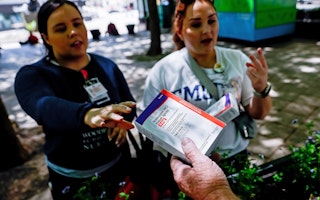Why Lawyers Must Challenge Mandatory Minimum Sentences in Canada
By Scott Bernstein
[Don’t] they recognize addiction for what it is? They know the people, they see their faces come in and out of jail all the time. Why is there never any intervention? [They’re] just happy giving them jail sentences and when the time is up, they release them back to themselves.
—Brent, Throwing Away the Keys
Despite the lowest crime rates in decades, the Canadian parliament enacted the Safe Streets and Communities Act last year. This “omnibus crime bill” introduced the first-ever mandatory minimum prison sentences for drug offenses in Canada.
Pivot Legal Society was concerned about the potential human rights impacts this legislation would have on low-income people who use drugs—including their right to equal protection under the law, freedom from cruel and unusual punishment, and their right to life—as well as what might be done to challenge these laws.
With the support of the Open Society Foundations, Pivot Legal Society interviewed 19 people who use drugs, asking them about their experiences with the criminal justice system. From these interviews came Pivot’s recent report, Throwing Away the Keys: The Human and Social Cost of Mandatory Minimum Sentences.
The report examines who will be harmed by the Safe Streets and Communities Act and investigates how the new legislation will engage rights guaranteed under the Canadian Charter of Rights and Freedoms. Its findings include:
- Key provisions of the law are likely to affect many marginalized people, including those living with both drug dependence and deep poverty;
- “Tough on crime” measures, including mandatory minimum sentences, are not an effective deterrent for people experiencing poverty and drug dependence;
- The application of these provisions will hurt the health and well being of drug-dependent people and marginalized communities;
- There is a lack of support for successful re-integration into community for people who have been in prison;
- There will be heavy economic costs associated with provisions of the law analyzed in this report.
In its report, Pivot also concluded that the legislation is likely to infringe upon the Charter rights of low-income people who use drugs, including:
- Section 7, the right to life, liberty, and security of the person, and the right to not be deprived of these unless done in accordance with the principles of fundamental justice. This report concludes that the lives of people who are dependent on drugs are put at increased risk through incarceration, where access to harm reduction interventions are not available.
- Section 15(1), the right to equal treatment and protection under the law. The report concludes that incarceration for drug offenses will disproportionately affect aboriginal people, people with the disability of drug dependency, and low-income people.
- Section 12, freedom from cruel and unusual treatment. Mandatory minimum sentences fail to leave room for discretion when sentencing people, and negate the judge’s responsibility to craft a sentence that is appropriate for a specific offender.
In this report, Pivot examines the legal inroads for challenging the Safe Streets and Communities Act, and issues a call to arms to the legal profession to join with nongovernmental organizations to challenge these laws as being unconstitutional.
The courts have not yet ruled on how mandatory minimums might stand up to challenges brought under all of these Charter provisions. However, the participants interviewed for this report describe conditions by which the provisions of the Act are likely to engage one or more Charter rights.
Given the courts’ recent expansive use of the Charter to protect the rights of marginalized communities, including the rights of homeless persons, sex workers, and injection drug users, there seem to be promising avenues for challenging the new legislation, including the mandatory minimum sentences for drug offenses.
The report also demonstrates that prison sentences can have very different consequences for different populations. Young people, mothers being separated from their children, Aboriginal offenders, and people with disabilities such as mental health issues and drug dependency are disproportionately negatively affected by prison. Based on the stories of participants, as well as legal and social scientific research, it is reasonable to conclude that this new legislation may compromise the protected equality rights of members of vulnerable communities.
Legislation that is discriminatory and infringes the rights of the most marginalized people in our society cannot be allowed to stand. One effective way to reverse this misguided legislation is for lawyers representing people captured by these provisions to challenge them in court using some or all of the grounds discussed in this report.
With the support of the legal community and nongovernmental organizations working in partnership, it will be possible to overturn these mandatory minimum sentences and restore more balance to the justice system for people who live on the margins of our society.
Pivot Legal Society’s report demonstrates that there are legal avenues to challenge the government of Canada’s implementation of regressive and harmful drug policy.
Until February 2017, Scott Bernstein was a program officer for the Global Drug Policy Program.


